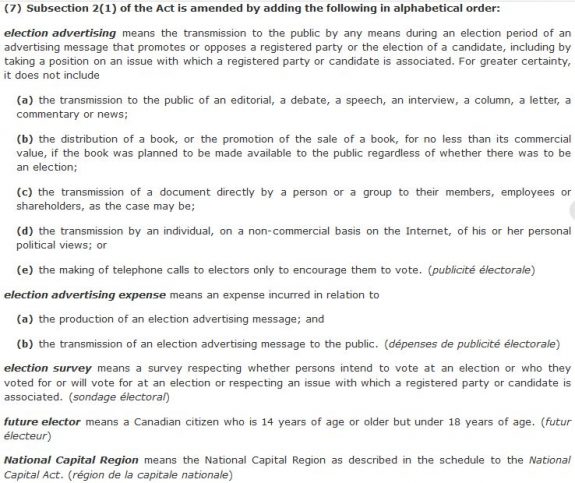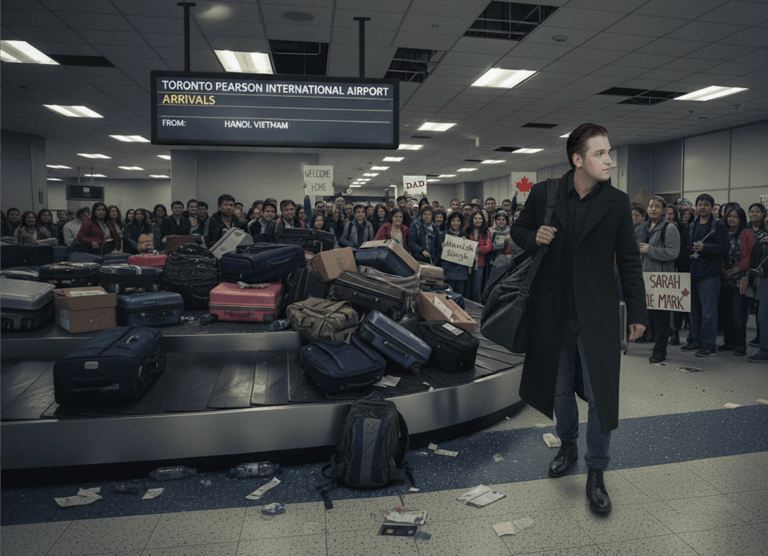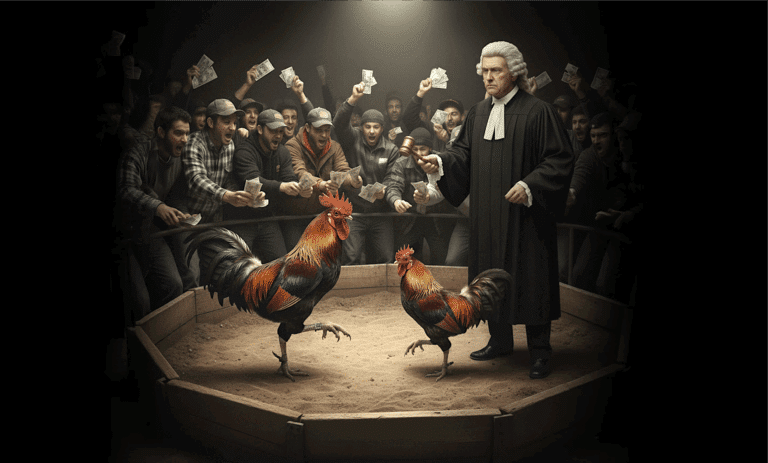In December 2018, Parliament passed Bill C-76 into law by a vote of 257-0. A longstanding adage holds that mischief is afoot whenever laws are enacted unopposed. And so it is with the Elections Modernization Act.
The “modernization” includes more stringent requirements on what might be construed as election-period “advertising” by so-called third parties. That is to say, by any Canadian who isn’t a professional politician or lucky enough to own or write opinion pieces for a legacy news media outlet. Politicians of all stripes like to control the message, and never more so than during an election period. They don’t like pesky third parties queering their pitch with inconvenient narratives, let alone allow them to expend financial resources in the hopes their message will reach a wider audience.


So Bill C-76 severely limits what third parties can spend, and forces them into an arduous process of registration and submitting filings with Elections Canada if they spend more than $500. Unlike the previous law, the new one applies not only to the five-week campaign itself, but to the two-and-a-half-month pre-writ period. For any media outlet or politically interested organization that wishes to use its own money to get its message out, that is a rather long time.
Exceptions to the prohibitions are found in section 2(1). Subsection (a) allows editorials, debates, speeches, interviews, columns, letters, and commentary. Subsection (b) allows “the distribution of a book, or the promotion of the sale of a book, for no less than its commercial value, if the book was planned to be made available to the public regardless of whether there was to be an election.” And “of course” subsection (e) allows “the transmission by an individual, on a non-commercial basis on the Internet, of his or her personal political views.” Phew! Individuals retain their free speech rights, such as they are. But we sure wouldn’t want anyone monetizing political commentary in competition with the approved, bought-and-paid-for media exempted in ss. (a).

Anyone who knows Ezra Levant of Rebel News even a little bit will appreciate that these amendments to the Canada Elections Act constituted an irresistible red flag. Levant wrote a new book last year, The Libranos, and released it during the pre-election period. He then promoted it in a variety of ways, including by distributing lawn signs looking conspicuously like the kind political candidates litter the countryside with every few years. The Libranos (reviewed here by Barry Cooper in C2C Journal) darkly depicts Prime Minister Justin Trudeau and senior ministers on its cover. The inside is as hard on today’s Liberals as one would expect Levant to be – that is to say, he says they’re just as bad as the old, 1980s and 90s versions.
It didn’t take official Ottawa long to notice. In a letter dated December 9, 2019, Rebel News was advised by the Commissioner of Canada Elections that it was under “administrative investigation” for the distribution of the lawn signs promoting Levant’s book. The letter hints, without expressly stating, that Levant offended the Act by timing his book’s release to coincide with the election period, and by spending more than $500 on lawn signs to promote the book without registering as a third party with Elections Canada. Ostensibly, the Commissioner was responding to a public complaint about Levant’s promotional activities. The letter requested a meeting at Elections Canada headquarters in Ottawa to assist the investigation.
A faux pas de deux
Levant obliged “under protest” – after splashing the news across the Rebel site and summoning his supporters to figurative battle. Late last month he travelled to Ottawa and met with two investigators, who were retired RCMP officers with 59 years of experience between them. According to Levant, they are both former terrorism investigators. They didn’t come off terribly well: alternately defensive, dismissive and evasive. Scowling one moment and smirking the next, the investigators even looked and sounded eerily similar. The duo seemed unready to do business, often futzing about shuffling papers, looking at their shoes or picking at their fingernails as Levant spoke. They didn’t control the meeting, or get to the heart of the matter.
None of this would normally see the light of day. We know all this, however, because Levant secretly recorded the meeting, then quickly posted it to the Internet (where it was promptly reposted on widely read U.S. sites) and had himself interviewed about the experience on Rebel News. A half-hour portion of the secret recording can be viewed here.


It is vintage Levant. The investigators seem flustered and bamboozled by Levant, who asks them more questions than the other way around. After they refuse to provide the original complaint against Rebel News, Levant denounces the “secret” document and theatrically refuses to disclose his own name, declaring it too a “secret”. He calls one of them “a bully and a censor”, declares their investigation “unlawful” and “unconstitutional” and asks whether one of them needs to step out “to get permission from your mom” to release the complaint. When one of them says he’s not “the lead investigator”, Levant calls him “the sandwich boy.” He declares them and the process “un-Canadian” and threatens to write “a chapter about you two fellas in the next edition” of his book.
Among the most revealing exchanges is when Levant says, “I’m just asking you to confirm that not a single, other, loving book of Trudeau is being investigated.” The investigators, of course, do not answer – while revealing they know of “over 24 books that were published around that period.” Denouncing Ottawa’s “bureaucrats and their blackface boss”, Levant declares that he will dedicate himself and all his guile and resources to “smashing this law.”
Observers of the Canadian political scene are witnessing a faux pas de deux: a pair of characters stumbling around to the amusement of partisans on each side. Both are compromised and, at times, seem almost clownish. There is a deadly serious point behind this dance, however.
Levant calls one of the elections investigators “a bully and a censor”, declares their investigation “unlawful” and “unconstitutional” and asks whether one of them needs “to get permission from your mom” to release the complaint against Rebel News. When one of them says he’s not “the lead investigator”, Levant calls him “the sandwich boy” and threatens to write “a chapter about you two fellas in the next edition” of his book.
One party – the “third party”, as it were – is standing up for free speech rights but has almost unquestionably broken the letter of the new law – indeed, initially admitted to doing so. This is something millions of Canadians still recoil against. The other has dedicated an array of bureaucratic resources to enforcing a law that is so whimsical, vague, self-contradictory and ultimately oppressive that some are comparing it to soft Stalinism.
And so far, the enforcers seem to have identified just one target: Levant’s Rebel News. To official Ottawa, he must seem irresistible as well. His enemies – and, when they’re not studiously ignoring him, mainstream media commentators – deride him as far-right, alt-right and even anti-Muslim. So among the bien pensants, he’s an easy and obvious target. And his book did go after the prime minister, who was just re-elected.
The process is only part of the punishment – the penalties are real
Some might well consider Levant’s response to the Commissioner’s letter and behaviour during his interrogation to be largely hyperbole, including inflated claims about the nature of the investigation, the injustices of the process, and the direness of the consequences, all in order to raise funds and increase his profile as a freedom fighter. The Act’s penalties, however, are no joke – and are all the more menacing for their vagueness.
In one place the Act specifies a maximum fine of $2,000, three months’ imprisonment, or both. Elsewhere it reads $5,000 plus six months. In still another spot it talks about a penalty five times the amount by which the accused’s expenses exceeded the permitted amount. And that’s just the beginning. If Levant violated the Act with intent, he might face criminal charges, exposing him to a fine of up to $50,000, five years’ imprisonment, or both.

Canada’s Elections Act as amended over the years is so convoluted and duplicative, so scattered in its provisions, that it would be almost impossible for the average layman to navigate. It isn’t clear, for example, whether Levant’s case would be seen as a single overall event, subject to a single penalty. Arguably, Rebel News could face a separate fine for each unlawful act: not registering, not appointing a financial agent, not setting up a separate bank account, not filing reports. Pretty soon, you’re talking real money. And any formal punishment comes on top of the time, stress and legal fees of mounting a defence, a situation others have aptly described as, “The process is the punishment”. Then again, it might also be a huge fundraising opportunity – not without some justification.
Bureaucracy will bureaucratize; but this investigation reached absurd proportions before Levant even had time to hire lawyers. The Commissioner assigned no fewer than five people to the matter: three lawyers and the two former RCMP investigators. A cynic might suspect these two were eyeing retirement and took a job at Elections Canada to wind down their careers with a few years of relaxed, easy, no-pressure bureaucratic work before their overly generous public pensions kicked in. Maybe it was an act; maybe their investigative strategy was to appear diffident and give Levant as much rope as he wanted to take, in the expectation that he would hang himself.
That they fell for Levant’s underlying tactic is stunning. As cursory perusal of the public record would reveal, not only does Levant seemingly live for these kinds of fights, he loves using the unforgiving eye of the camera to discredit overbearing authorities. Back in 2008 Levant insisted on video-recording the Alberta Human Rights Commission’s interrogation of him over his publication of the infamous “Muhammad Cartoons”, gaining so much public sympathy that the tables turned on the investigators.

He’s also well aware of the U.S. conservative activist James O’Keefe’s Project Veritas, which carries out surreptitious recordings by undercover journalists to expose nefarious activities. (In this vein, Levant held back what he earlier this week was billing as “part two” of the secret recording, which he promised contained the “worst parts”.) That our elections investigators failed to anticipate a similar move on Levant’s part seems farcically obtuse – but proved highly enlightening for the public. As Levant later declared of his Ottawa scoop, “No one will believe how bad [kangaroo courts] are unless they see it with their own eyes.” (Of course, his interrogation wasn’t actually a trial just yet.)
If one takes the investigators at their word, Rebel News stands accused of a mere “administrative offense.” This term does not appear in the Act, however; its use seems to suggest the criminal provisions were not being invoked. Playing psychological games with the “suspect” in this case is hardly called for. Why not just come right out and ask for an admission of the key elements of the offense? It’s not as though Levant is shy about defying government speech codes. And why not just ask for the records you want Levant to turn over, or subpoena them, and get on with it?
Bureaucratic work expands to consume the budget allotted to it. Levant, for his part, was playing to the crowd. His complaints about the process being a “Star Chamber that is illegal” seem exaggerated. He isn’t being investigated for writing a book critical of Trudeau – not technically, at least. And on its face, he did break the law. Nor is Levant entitled to know the identity of his accuser; that legal right comes after one has been charged. Different rules apply in the investigation stage, and perhaps Levant knows that. It’s not the investigator’s job to explain or defend the law. Further, unlike in his previous ordeal 12 years ago, due process appeared to be followed here. Levant was told he could have a lawyer present.
That two former RCMP anti-terrorism sleuths with 59 years’ experience between them fell for Levant’s underlying tactic – the secret video recording – is stunning. As cursory perusal of the public record would reveal, not only does Levant seemingly live for these kinds of fights, he loves using the unforgiving eye of the camera to discredit overbearing authorities.
The odour of selective enforcement hangs over the affair, however. Perhaps the seeming inconsistency is simply because those on the right don’t formally complain about people on the left breaking an obtuse, oppressive law that conservatives think shouldn’t be on the books to begin with. Then again, how would we know?
Earlier this week, Levant fired off a lawyer’s letter to the Commissioner arguing the probe was “irreparably tainted” by the investigators’ conduct, which it alleged had not followed due process protections, and that Rebel News’ promotion of The Libranos met the exemptions provided in the Act and, therefore, had not violated the law after all. Like nearly all of Levant’s public communications, the letter is strongly worded and makes a number of claims that have yet to be tested.
Another serious state encroachment on our freedoms
The far more serious question underlying this petty investigation is whether the law as it stands is an unconstitutional limit to the Canadian Charter of Rights and Freedoms’ protection of free expression. The Act’s exception that is carved out for books, and for the advertising of books, seems too restrictive of the free exchange of ideas, as well as needlessly damaging to content producers’ freedom to reach Canadians, and their freedom to take in whatever information interests them.
From a purely commercial point of view, the best time to release and promote a book about a political party or leader is right before an election campaign. No writer would spend months researching and writing such a book and time its release for just after an election, because no voter would be interested if the party were defeated or the losing leader stepped down.
Moreover, there is no difference of principle between releasing and promoting a book about a political party or leader during an election campaign, and publishing a string of newspaper columns about a political party or leader during an election campaign. And such outlets are allowed to advertise their existence throughout. The government-subsidized CBC certainly doesn’t go dark; nor the Globe and Mail. The exemption in subsection (a) is much broader than that in subsection (b), which is arbitrary and discriminatory against book authors and publishers. Every author and every journalist should be concerned with the overreach of Parliament here – as should every engaged citizen.

For smaller media outlets, including online ventures, the new law is a particular problem. On June 30 of last year – the start of the pre-writ period – C2C Journal faced this very situation. The publication decided to follow the law to the letter. The Journal suspended promotional spending on articles that were not merely about the election campaign, but that so much as mentioned any federal politician, party, law, proposal, policy, event or controversy, even one in which the primary subject matter was provincial or municipal.
It needs to be clear that Bill C-76 does not merely forestall new or additional promotional spending. C2C Journal was already spending a certain amount to promote its full range of articles, including those about federal politics. The election-period restrictions forced the publication to reduce these activities. This even extended past election night, as the Journal needed to re-register with its social media advertising vehicles. Perhaps this kind of thing is just what the governing party intended; it’s difficult to see every opposition MP feeling the same.
Bill C-76 is absurd at its heart
Like many other outlets, C2C also encountered the conceptual absurdity at the heart of the law. A media venture, think-tank, advocacy group or solo journalist or activist can spend any amount of money on producing content and running its business throughout the election cycle. It can hire staff, give them raises, buy computers, move to nicer digs, design a new website, and so on, without limitation. It can increase the amount of content it produces. It can even increase its pace of “free” communication, like e-mail blasts. And if that outlet is fortunate enough already to have a large, established audience, its influence could be significant throughout the election period. But try spending money directly to gain or grow your audience – even $1,000 – and you could end up in the slammer. Such a law should not stand in any respectable society.
It needs to be clear that Bill C-76 does not merely forestall new or additional promotional spending. C2C Journal was already spending a certain amount to promote its full range of articles, including those about federal politics. The election-period restrictions forced the publication to reduce these activities.
For these reasons, I think there’s a good chance the law under which Levant is being investigated will be struck down as an unreasonable limit on political speech in Canada. But it’s not certain. The Canadian judiciary is not a reliable defender of free speech; a judge might decide a “more nuanced” decision is better than a principled one. A court might well hold that the law against publishing a book to coincide with an election is unconstitutional, while upholding restrictions on how a book can be promoted during the period in question. Presumably, the analogous restrictions on other “third-party” outlets would also stand. That would be unprincipled and wrong; that doesn’t mean it can’t happen.
The more important lesson in all of this is that, if you value freedom of expression, if you value freedom of the press – including of non-traditional media – it is never a bad time to express your concerns over the limitations. It doesn’t matter how you voted; all parties are to blame, for all of them and all the MPs present supported the current law. Former Conservative MP Maxime Bernier (now People’s Party of Canada leader) is the only member to express disapproval – but even he did not show up to vote against them.
Grant A. Brown has a DPhil from Oxford University and an LL.B. from the University of Alberta, taught applied ethics and political philosophy at the University of Lethbridge, practised family law, and currently runs a B&B in Stratford, Ontario.






